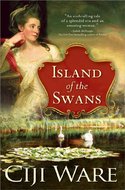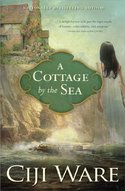Ciji Ware | Can You Name That Theme

 I think perhaps one of the hardest things for a budding novelist to master is determining what the "through line" is and meaning of the book you are writing.
I think perhaps one of the hardest things for a budding novelist to master is determining what the "through line" is and meaning of the book you are writing.In other words: what is its theme?
I am not talking about the book’s "message," though there certainly may be one by the time the story ends.
Think, for a moment, about the Wizard of Oz
At the heart of both stories is the idea that we humans long for and are hard-wired to want the safety and refuge of being in a familiar place, inhabited by the people we love. The simplest and most simplistic expression of the theme? "Home is where the heart is."
In my experience, however, I often don’t uncover the theme until I’m well into writing a new book.
 For instance, I was very nearly at the end of ISLAND OF THE SWANS before it dawned on me: this is a story about coping with nearly unbearable loss.
For instance, I was very nearly at the end of ISLAND OF THE SWANS before it dawned on me: this is a story about coping with nearly unbearable loss. My eighteenth Scottish heroine, based on an historical figure, is the beautiful Jane Maxwell, the 4th Duchess of Gordon, whose dates are 1749-1812 (The image of Jane gracing the cover of this Sourcebooks Landmark edition is from the Scottish National Portrait Gallery).
Very early in the telling of my tale, Jane loses a finger in an accident, thus marring the perfection of her extraordinary good looks.
Soon, she believes she has lost the single most important person to her in the world, and toward the end of the novel, she must cope with difficult choices forced upon her that make her wonder if everything she ever dreamed of and fought for was gone forever. As all good heroines do, however, she manages to triumph in the end, but not without great struggle to overcome the odds stacked against her. "Loss" and triumphing over it were at the very core of this amazing, true-life tale.
In Search of Your Novel’s Theme
As your own writing progresses, if you haven’t already, you'll begin to uncover the connections and relationships that you may not have realized you’d even created when you originally planned the basic outlines of your novel.
If you're frustrated in trying to find your theme, think first of the Seven Deadly Sins: sloth, gluttony, lust, envy, pride, covetousness/greed, and anger. Do any of those offer clues to what your story is truly about?
Many novels derive their themes from these universal "unethical acts": (i.e. "God'll get you for that!")-and often you’ll be able to ferret out the kernel of what your story is about if you simply ask yourself: "What unethical acts have been committed against my heroine and hero?"
As you work through your first draft, in the back of your mind keep a lookout for those connecting relationships between elements in your story. These elements are the underlying foundation-points of the tale you're telling. Are your characters dealing with lust, pride, anger, envy, or something closely akin?
Sometimes, there isn’t a line in the book that states precisely what these elements/themes are...but, if you become conscious of patterns and similarities unfolding in the plot, you’ll find that a theme is in there, holding your story together like steel girders in a building.
Ask yourself:
• What self-knowledge has the hero/heroine gained by the end of the story?
• What lessons have been incorporated into the very fiber of your main characters?
The answers you give, however subtly presented, may be your theme and can serve as the elements that give your readers satisfaction when they finished the last page of your novel.
Why Having A Theme Matters in Fiction
 These thematic elements are the glue that cement your story to your reader's own life experience, but we writers must, at all costs, avoid being preachy and find ways in which to skillfully weave the theme into your story. In the second of my novels being re-issued by Sourcebooks Landmark in 2010, A COTTAGE BY THE SEA, the theme is simple: how can we forgive the unforgivable and reinvent our lives after unthinkable tragedy?
These thematic elements are the glue that cement your story to your reader's own life experience, but we writers must, at all costs, avoid being preachy and find ways in which to skillfully weave the theme into your story. In the second of my novels being re-issued by Sourcebooks Landmark in 2010, A COTTAGE BY THE SEA, the theme is simple: how can we forgive the unforgivable and reinvent our lives after unthinkable tragedy? In this story that weaves the ancient past with a contemporary present, we have a double dose of unethical acts of adultery committed against the heroine (a Seven Deadly Sin that combines lust and coveting)...along with the burning question: how can a person who has been dealt a series of terrible personal blows because of an envious sister and narcissistic husband, put her life back together again?
Thus, we have Envy--another of the Seven Deadly Sins--as well as Pride on the part of a famous film director/husband who always put his needs and wants ahead of everyone else’s. The theme is about the journey to recover the heroine’s soul, regain her purpose in life, and to feel joy once more. In a nutshell: personal reinvention.
But here’s a yellow flag of caution: Writers need guard against being heavy-handed regarding this theme business. It can’t be manufactured. The theme isn’t an overlay or an add-on. It’s organic to the plot; it must be naturally embedded in the bones of the story itself.
Think about the novels you’ve loved and see if you can find such themes as:
• Atonement and redemption
• Love conquers all
• Watch out what you wish for
• Consequences of seeking revenge
• Battle of the sexes
• What goes around, comes around
If you suddenly "see"--as I did so late in the game writing my first historical novel, Island of the Swans--that there was a connecting thread to nearly everything that happened to my heroine, you’ll have discovered your theme.
And once you have, Bingo! If you’re a budding novelist, I predict that your second draft and consequent rewrites will go much more smoothly.
ISLAND OF THE SWANS BY CIJI WARE in stores February 2010
Re-issued in its original full length, this acclaimed and bestselling romantic historical novel by award-winning author Ciji Ware tells the true story of passionate and flamboyant Jane Maxwell, the 4th Duchess of Gordon (1749-1812). In love since childhood with Thomas Fraser, when she hears that he's been killed in America, she marries the Duke of Gordon with disastrous results. But Fraser, very much alive, returns to England to claim her love.
In addition to telling a heart-wrenching love story, ISLAND OF THE SWANS also paints a fascinating portrait of a powerful and controversial woman and the tumultuous era in which she lived. Patroness of poet Robert Burns, advisor to King George, painted by Sir Joshua Reynolds, Jane Maxwell was a towering figure in her own time and is an unforgettable heroine.
About the Author
Ciji Ware has been an Emmy-award winning television producer, reporter, writer, and radio host. A Harvard graduate, she has written numerous historical and romance novels as well as non-fiction. When she's not writing, Ciji is a Scottish history and dancing aficionado. She lives with her husband in California.
To comment for a chance to win a prize please click here.
Labels: ciji ware


0 Comments:
Post a Comment
Subscribe to Post Comments [Atom]
<< Home